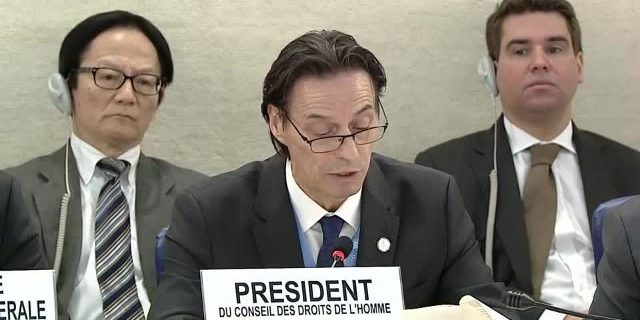The United Nations Human Rights Council adopted a resolution calling on all states to protect civil society groups from threats and intimidation, and prosecute reprisals against them.
Chile presented the resolution text on behalf of more than 50 countries on the final day of a three-week session.
Amendments proposed by China, Pakistan and Russia – declaring that civil society groups must respect “the sovereignty and territorial integrity of states” and that their funding must be “legal and transparent” – were soundly defeated.
“China and Russia are often the least tolerant of civil society at home. They are now seeking to introduce similar restrictions at the international level,” John Fisher of Human Rights Watch told Reuters.
Their attempts to place national sovereignty above international human rights law “would turn guarantees of peaceful assembly and association on their heads”, he said, welcoming the defeat of the proposals.
China has featured prominently in U.N. reports on harassment and reprisals against domestic activists trying to bring violations to the attention of the Geneva forum, including preventing them from traveling.
“These amendments were a swing and a miss for China and its allies on the Council,” Sarah Brooks of the International Service for Human Rights told Reuters, using an American baseball term.
“Their efforts to limit civil society’s independence and shut down civil society voices were rebuffed by a strong message – from member states across the globe – about the importance of keeping defenders’ voices at the table,” she said.
Britain, Germany, Switzerland and the European Union backed the need for protecting space for campaigners, including online.
“Civil society organizations provide legitimate channels for citizens to express their concerns about their government and on issues that matter to them,” Britain’s ambassador Julian Braithwaite said.
Yu Jianhua, China’s ambassador, said his country had 700,000 legally-registered social organizations. China supports their engagement in international and regional bodies, but such groups must be “responsible stake-holders”, he said.
China would abstain on the “unbalanced and unobjective” resolution, Yu said.
At the current session, China tried unsuccessfully to block the accreditation of Uighur activist Dolkun Isa, U.N. sources said. China’s delegation publicly challenged activists speaking on behalf of Uighur and Tibetan ethnic minorities.
Council president Vojislav Suc, Slovenia’s ambassador, said allegations of intimidation and reprisals had emerged during the session and urged “all necessary measures” to prevent such acts.
Reporting by Stephanie Nebehay; Editing by Mark Heinrich







